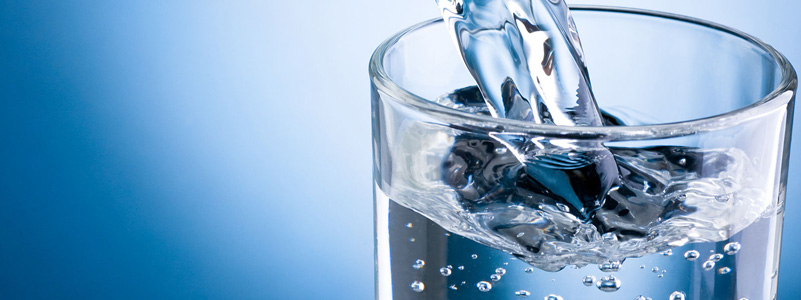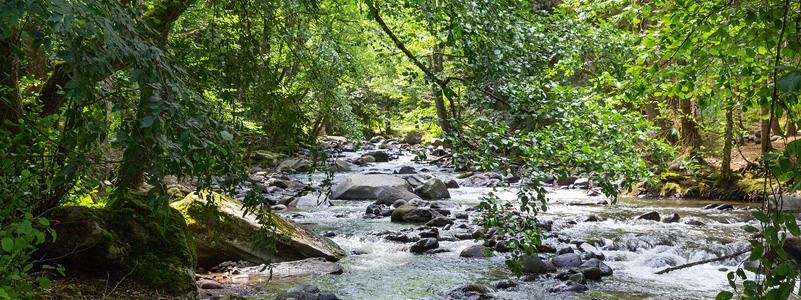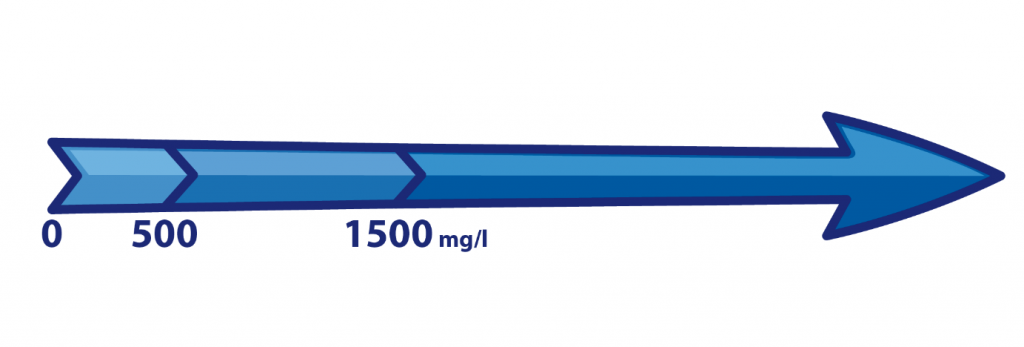UNDERSTANDING
WATER
Drinking water daily is necessary for a good body functioning. The water is the only drink necessary for life and is essential
to ensure good hydration .
It is recommended to consume at least 2 liters of water per day mainly to compensate for the losses linked to sweating, urine and even breathing.
Obviously needs vary according to individuals and circumstances. Drinking water is all the more essential in the event of high heat, stress or during exercise to drink better, Sources ALMA, has implemented the method of fractional hydration. For more information, go and visit : www.cestlheuredeboire.com
There are different types of waters : spring waters, mineral waters and tap waters. Some provide minerals like magnesium, calcium, bicarbonates.
Some are preferred for feeding babies. Discover the differences and the interest of each and test your knowledge.

- Our bodys naturally lose water and also essential minerals everyday. To compensate these losses, an easy and natural solution is too consume waters rich in minerals. Thanks to the differents minerals compositions of Sources ALMA spring water,
you will always find the appropriate type of water for you. - Mineral waters are characterised according to their mineral composition and their mineral
Collected at a depth which is protected from human pollution, mineral water is a real gift of nature. Microbiologically healthy and characterised by its original purity, mineral water guarantees a unique composition in minerals salts and stable over time. Healthy and pure bottled on site, the mineral water does not undergo any chemical treatment nor addition of chlorine. It is the only one to profit of favourable properties for the health and recognized by Academy Medicine.

- Mineral water naturally sparkling: refers to water whose carbon dioxide content from the same groundwater is equivalent to that observed at emergence. E.g : Rozana, St-Yorre, Vernière, VICHY Célestins.
- Natural mineral water sustained with source gas: refers to water whose carbon dioxide content from the same groundwater is higher than that observed at emergence.
- Natural mineral water with carbonic gas addition: it is a water made effervescent by the addition of carbonic gas from a different origin than the source

- Spring water is water from underground, microbiologically healthy protected against pollution risks. Collected in its natural state, it is acceptable for human consumption.
- Spring water with carbonic gas addition: it is water made effervescent by the addition of carbonic gas from a different origin than the source.
A natural mineral water is collected deep down in an area protected from human pollution, natural mineral water is a true gift of nature.
Microbiologically healthy and characterised by its original purity, mineral natural water guarantees a unique and stable composition in mineral salt. It is the only one to benefit of acceptable properties for the health recognised by the “Academy of Medicine.”
Water classification according to minerality

Some low mineralised water (mineral content below 500 mg/l) may be recommended for infant feeding. Suitable for everyone, medium mineralised water (between 500 mg/l and 1500 mg/l) are waters to be consumed on all occasions. Mineral-rich waters (above 1500 mg/l) can be used to supplement daily mineral intakes while providing their benefits to the body.
All waters don’t have the same minerality. More than 1500mg/l, mineral water is considered as rich in mineral.
Minerality scale (in mg/l)
Only a few waters are naturally rich in minerals: with 4774mg of minerals/l, St-Yorre is in the strongly mineralised water category as Vichy Celestins (3325 mg/) Rozana (3022mg/l), St Antonin (2440 mg/l), Courmayeur (2146mg/l).
In some cases, mineral-rich water not only provides you with water but also with minerals in interesting guaranteed quantity that is beneficial to the body’s proper functioning. The benefits of a mineral water vary, depending on its mineral composition. Identified according to its richness and mineral profile, each mineral water offers a specific taste and composition: calcium, magnesium, bicarbonate…
Choose the one that best suits your taste and needs.
Learn more
Magnesium is essential for the organism, it plays an important part in regulating nerve impulses and muscle relaxation. It also contributes to the proper functioning of transit and is even involved in the production of energy : magnesium deficiencies can contribute to anxiety, insomnia and fatigue. However, 7 out of 10 French people have insufficient magnesium* intake, which is why it is important to provide all the magnesium our body needs through our nutrition. Some foods contain magnesium, the best known being chocolate. Magnesian mineral waters (magnesium > 56mg/l) can also help to supplement daily intakes, such as Rozana natural mineral water (magnesium: 160mg/l). Rozana is a source of magnesium and is also available in 50cl bottles.
*source : étude SU.VI.MAX
Make a difference between salt and sodium is essential because we recommend reducing salt consumption (sodium chloride). In food, sodium comes from sodium chloride.
However, in mineral and sparkling waters, sodium comes from sodium bicarbonates. Some scientific researches (JJ Helwig – “Medicine and nutrition 2008” vol.44 n°1 p.29-37) demonstrate, opposite to salt, sodium bicarbonate hasn’t effects on hypertension.
All adult in good health can daily drink sparkling waters rich in sodium bicarbonate (as St-Yorre and VICHY Celestins) and benefit of their mineral wealth.
Sodium is necessary for good function of muscular system. It accelerates water absorption by favouring a quick rehydration. During sustained effort, it is recommended to choose sodium water (more than 200mg of sodium by litre)
*In case of serious pathology (cirrhosis, heath failure, edema) patient can be subjected by his doctor to a strict diet without sodium. Ask recommendation to your doctor.
Am I well hydrated? How can you be sure you are drinking enough every day?
We have developed the method of fractional hydration with an application www.cestlheuredeboire.fr which tells you when and what water to drink depending on your situation, your age or your activity.
It allows you to set up reminders to think about drinking regularly and being hydrated as well as graphically tracking the calories absorbed while drinking thanks to the hydro-caloric calculator. You can also track the history of your daily drink consumption.
Chron’eau helps you choose the water best suited to your profile, mineral waters with different characteristics, which distinguish them by their mineral content and therefore their benefits.
Would you like to know more?
Go to www.cestlheuredeboire.fr or to our CHRONEAU application.
Infant feeding is principally composed of milk, which provides much needed minerals for infants. So, the best choice, after maternal milk, for hydration and baby bottle preparation is low mineralised water.
After the birth, babies ‘immune system and some of their organs, such as kidneys are immature. That’s why infants need low nitrate water (<10 mg/l) and low mineralised (dry residue at 180°C <500mg/l) water because minerals contents in maternal milk and infant formula are enough to fulfill babies ‘needs.
It is better to choose natural mineral water or spring water rather than tap water which we don’t know the exact composition and which nitrate content can be more than 50mg/l.
Waters are controlled, and when they respect the 55 criteria (47 criteria of the appendix IV decree of 14/3/07 and appendix II of decree 28/12/10 and criteria that make up the appendix I of table A) from European and French regulation, they are recommended for babies. The mention “appropriate for infant feeding” and baby logo are on the label.
Both imperishable and transparent, the PET bottle perfectly preserves the natural mineral waters integrity and the one of the source waters. This material enabled to considerably reduce the packaging weight and so the environmental impact of the bottles. Regarding quality and security, the PET (plastic resin used to produce bottles) is validated by the ANSES, the national food safety agency. Those water bottles are the object of regular strict controls.
Do you know it?
The PET bottle is the second best sorted packaging after the glass.
Nowadays, the PET environmental record is more interesting than the glass one.



